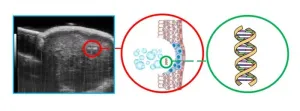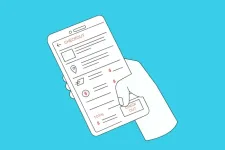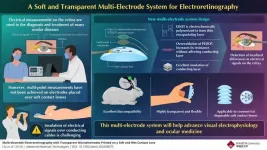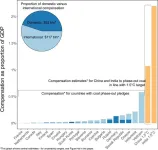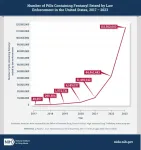(Press-News.org) COLUMBUS, Ohio – Actually, sometimes consumers don’t want to talk to a real person when they’re shopping online, a new study suggests.
In fact, what they really want is a chatbot that makes it clear that it is not human at all.
In a new study, researchers at The Ohio State University found that people preferred interacting with chatbots when they felt embarrassed about what they were buying online – items like antidiarrheal medicine or, for some people, skin care products.
“In general, research shows people would rather interact with a human customer service agent than a chatbot,” said Jianna Jin, who led the study as a doctoral student at Ohio State’s Fisher College of Business.
“But we found that when people are worried about others judging them, that tendency reverses and they would rather interact with a chatbot because they feel less embarrassed dealing with a chatbot than a human.”
The study was published recently in the Journal of Consumer Psychology with study co-authors Jesse Walker, assistant professor, and Rebecca Walker Reczek, professor, both in marketing at Ohio State’s Fisher College.
“Chatbots are becoming more and more common as customer service agents, and companies are not required in most states to disclose if they use them,” Reczek said. “But it may be important for companies to let consumers know if they’re dealing with a chatbot.”
The new research explored what happened when consumers had what psychologists call self-presentation concerns – this is when people worry about how their behavior and actions may affect how others perceive them. Buying some products may trigger these concerns.
In one of the five studies that was part of the Journal of Consumer Psychology paper, the researchers asked 386 undergraduate students to imagine buying either antidiarrheal or hay fever medication. They were given the choice between two online drug stores, one of which used chatbots and another that used customer service agents.
When participants were told they were buying hay fever medication, which doesn’t cause most people to feel embarrassed, 91% said they would use the store that had human service agents. But when they were buying antidiarrheal medicine, 81% chose the store with the chatbots.
But that’s just the beginning of the story. The researchers found in other studies that it was important how human the chatbots appeared and acted onscreen.
In another study, participants were asked to imagine buying an antidiarrheal medicine from an online drugstore. They were then shown one of three live chat icons: One was a chatbot with an icon that was just a speech bubble, with no human characteristics; a second was a chatbot with a cartoon of a human; and the third featured a profile picture of a real clearly human woman.
Both chatbots clearly identified themselves to participants as chatbots – but the one with the cartoon of a real human used more emotional language during the exchange, such as “I am so excited to see you!”
Results showed that participants were more willing to receive information about the embarrassing product from the two chatbots than from the human. But the effect was not as strong for the chatbot with the human cartoon avatar that used more emotional language than the other chatbot.
The fact that this chatbot had a cartoon human avatar and used emotional language may have left those in the study feeling uneasy and less willing to interact – even though they were told it was a chatbot, Walker said.
“It was as if the participants were proactively protecting themselves against embarrassment by assuming the chatbot could be human,” Walker said.
In another study, Jin actually designed a chatbot and had participants engage in a real back-and-forth interaction. Participants in this study were chosen because they all strongly agreed that they wanted to make a good impression on others with their skin.
In other words, they had self-presentation concerns related to their skin and may have been interested in buying skincare products because they were embarrassed about their skin. Because of this, the researchers believed that they would respond more positively to clearly identified chatbots.
Participants in the study were told they were interacting with an agent for a skincare brand and whether they were talking to a chatbot or a customer service representative. Participants answered a series of questions, including one in which they were asked if they would like to provide their email address to get a free sample of the brand.
As the researchers hypothesized, participants were more likely to provide their email address if they thought they were interacting with a chatbot (62%) than a human (38%).
In this study, as well as others, the researchers asked questions designed to get at why participants prefer chatbots when they had self-presentation concerns.
Walker said the results of the study suggest chatbots decrease embarrassment because consumers perceive chatbots as less able to feel emotions and make appraisals about people.
“Consumers feel less embarrassed because chatbots don’t have the level of consciousness and ability to judge them,” he said.
Jin, who is now an assistant professor at the University of Notre Dame, said the results suggest companies need to pay attention to the role of chatbots in their business.
“Managers may not realize the importance of using chatbots when consumers have self-presentation concerns,” she said.
And as conversational AI continues to get better, it may become more difficult for consumers to tell the difference between chatbots and human service agents, Reczek said. That could be a problem for companies whose customers may prefer to interact with chatbots because of their self-presentation concerns and fears of embarrassment.
“It is going to be even more important for firms to clearly disclose that they use chatbots if they want consumers to realize they are interacting with a bot,” Reczek said.
END
When consumers would prefer a chatbot over a person
Fear of embarrassment can lead people to avoid the human touch
2024-05-13
ELSE PRESS RELEASES FROM THIS DATE:
Intense ultrasound extracts genetic info for less invasive cancer biopsies #ASA186
2024-05-13
OTTAWA, Ontario, May 13, 2024 – Ultrasound imaging offers a valuable and noninvasive way to find and monitor cancerous tumors. However, much of the most crucial information about a cancer, such as specific cell types and mutations, cannot be learned from imaging and requires invasive and damaging biopsies. One research group developed a way to employ ultrasound to extract this genetic information in a gentler way.
At the University of Alberta, a team led by Roger Zemp explored how intense ultrasound can release biological indicators of disease, or biomarkers, from cells. These biomarkers, ...
Weight loss drug linked with reduced need for diuretics in heart failure patients
2024-05-13
Lisbon, Portugal – 13 May 2024: Semaglutide reduces the need for loop diuretic use and dose, and has positive effects on symptoms, physical limitations, and body weight in patients with heart failure with preserved ejection fraction (HFpEF) regardless of diuretic use, according to late breaking research presented today at Heart Failure 2024, a scientific congress of the European Society of Cardiology (ESC).1
HFpEF is a condition in which the heart pumps normally but is too stiff to fill properly, rendering the heart unable to support the body’s need for oxygen-rich blood. The condition is becoming more common as populations ...
Getting out of the political echo chamber
2024-05-13
Civilized political debates may seem increasingly out of reach as democracies across the world face rising polarization, but people still want to discuss issues with people they disagree with – especially those who present themselves as balanced and willing to seek solutions that work for everyone or open to learning new information, according to two studies published by the American Psychological Association.
One study, published in the Journal of Experimental Psychology: General, examined how U.S. politicians and ordinary Americans with opposing political beliefs could share their ideas on divisive issues in a way that improved respect regardless of political ...
Alarming rise of electronic vaping use in U.S. adolescents
2024-05-13
Electronic vapor products (EVPs), also known as e-cigarettes or vaping devices, have an allure because of their marketed image as a safer alternative to traditional cigarette smoking and for their variety of appealing flavors.
Yet, they contain many substances beyond nicotine, including propylene glycol, glycerin, flavorings and potentially harmful chemicals such as formaldehyde and metals, which could pose significant health risks such as respiratory disease, cardiovascular disease and cancer. Vaping also is strongly linked with a serious medical condition that damages the lungs due to the vitamin E acetate, an additive used ...
More than half of Americans give to charity at checkout, survey shows
2024-05-13
BINGHAMTON, N.Y. -- 53% of Americans give impulsively to charities at the checkout, and certain demographics tend to give more, according to a new survey conducted by faculty at Binghamton University, State University of New York.
From supermarkets to retail, Americans are used to being asked for donations while making in-person or online purchases – whether by rounding up, donating a set amount or purchasing a token. Industry reports reveal how money is being raised – checkout charity campaigns brought in almost $750 million in 2022, with campaigns through ...
Taking electroretinography to the next level with a soft multi-electrode system
2024-05-13
Eye diseases are becoming more prevalent worldwide, partly because of the aging population, but also because of our greatly increased screen time compared to previous generations. Considering our use of displays will most likely keep rising due to technologies such as virtual and augmented reality, we must improve our diagnostic techniques for the early detection and monitoring of ocular diseases.
Among the arsenal of tools ophthalmologist have at their disposal, electroretinography (ERG) still holds much-untapped potential. Simply put, ERG consists of taking measurements of the electrical ...
New Study: The price tag of phasing-out coal
2024-05-13
Coal phase-out is necessary to solve climate change, but can have negative impacts on workers and local communities dependent on coal for their livelihoods. Researchers at Chalmers University of Technology in Sweden and Central European University in Austria have studied government plans for coal phase-out around the world and discovered that more than half of such plans include monetary compensation to affected parties. This planned compensation globally amounts to USD 200 billion, but it excludes ...
Dramatic increase in fentanyl seized by authorities in last six years
2024-05-13
The number of illicit fentanyl seizures by law enforcement in the United States grew by more than 1,700 percent between 2017 and 2023, according to a new analysis. Further, the share of total fentanyl seizures that involved pills quadrupled over the same period–with the 115.6 million pills seized in 2023 representing 49 percent of total seizures.
This is the first time that such up-to-date seizure data has been published differentiating between fentanyl powder and pills, says the research team led by experts at NYU Grossman School of Medicine and the University of Florida.
Law enforcement drug seizures are used as a proxy for drug availability ...
What makes a memory? It may be related to how hard your brain had to work
2024-05-13
New Haven, Conn. — The human brain filters through a flood of experiences to create specific memories. Why do some of the experiences in this deluge of sensory information become “memorable,” while most are discarded by the brain?
A computational model and behavioral study developed by Yale scientists suggests a new clue to this age-old question, they report in the journal Nature Human Behavior.
“The mind prioritizes remembering things that it is not able to explain very well,” said Ilker Yildirim, an ...
Over 115 million pills containing illicit fentanyl seized by law enforcement in 2023
2024-05-13
Law enforcement seizures of illicit fentanyl increased dramatically in number and size between 2017 to 2023 in the U.S., especially in pill form, according to a new study funded by the National Institutes of Health’s (NIH) National Institute on Drug Abuse (NIDA). The number of individual pills containing fentanyl seized by law enforcement was 2,300 times greater in 2023 compared to 2017, with 115,562,603 pills seized in 2023 vs. 49,657 in 2017. The proportion of fentanyl pill seizures to the total number of fentanyl seizures more than quadrupled, ...
LAST 30 PRESS RELEASES:
Trapping light on thermal photodetectors shatters speed records
New review highlights the future of tubular solid oxide fuel cells for clean energy systems
Pig farm ammonia pollution may indirectly accelerate climate warming, new study finds
Modified biochar helps compost retain nitrogen and build richer soil organic matter
First gene regulation clinical trials for epilepsy show promising results
Life-changing drug identified for children with rare epilepsy
Husker researchers collaborate to explore fear of spiders
Mayo Clinic researchers discover hidden brain map that may improve epilepsy care
NYCST announces Round 2 Awards for space technology projects
How the Dobbs decision and abortion restrictions changed where medical students apply to residency programs
Microwave frying can help lower oil content for healthier French fries
In MS, wearable sensors may help identify people at risk of worsening disability
Study: Football associated with nearly one in five brain injuries in youth sports
Machine-learning immune-system analysis study may hold clues to personalized medicine
A promising potential therapeutic strategy for Rett syndrome
How time changes impact public sentiment in the U.S.
Analysis of charred food in pot reveals that prehistoric Europeans had surprisingly complex cuisines
As a whole, LGB+ workers in the NHS do not experience pay gaps compared to their heterosexual colleagues
How cocaine rewires the brain to drive relapse
Mosquito monitoring through sound - implications for AI species recognition
UCLA researchers engineer CAR-T cells to target hard-to-treat solid tumors
New study reveals asynchronous land–ocean responses to ancient ocean anoxia
Ctenophore research points to earlier origins of brain-like structures
Tibet ASγ experiment sheds new light on cosmic rays acceleration and propagation in Milky Way
AI-based liquid biopsy may detect liver fibrosis, cirrhosis and chronic disease signals
Hope for Rett syndrome: New research may unlock treatment pathway for rare disorder with no cure
How some skills become second nature
SFU study sheds light on clotting risks for female astronauts
UC Irvine chemists shed light on how age-related cataracts may begin
Machine learning reveals Raman signatures of liquid-like ion conduction in solid electrolytes
[Press-News.org] When consumers would prefer a chatbot over a personFear of embarrassment can lead people to avoid the human touch
